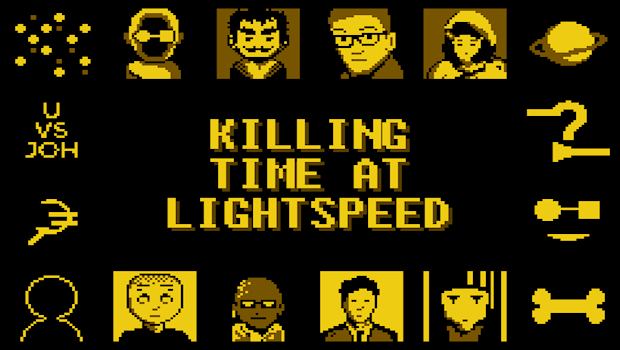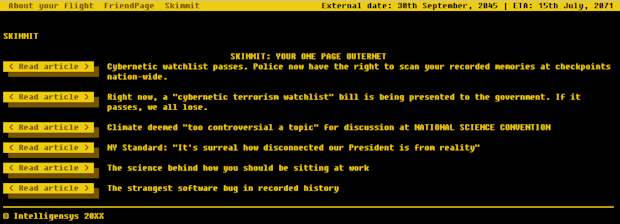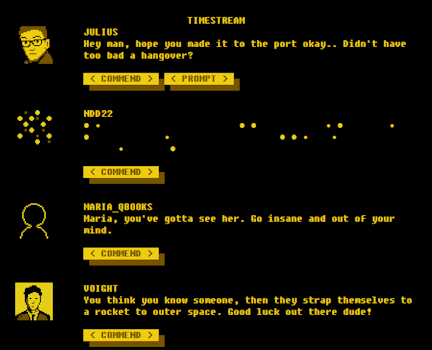I really wish video games would try to incorporate hard sci fi into their narratives more often. The pulpy genre work is all well and good, but sometimes you just want to be bludgeoned round the head with science. Time dilation is a concept that never really gets its due in games. If you don’t know what it is, imagine a spaceship travelling away from Earth at the speed of light, to make a one hour journey to a spaceport. To the pilot arriving at their destination one hour has passed. However while they were travelling at lightspeed, several years have elapsed back home on the planet. It’s all to do with how the perception of time changes around gravitational masses and such. I’m no scientist but I do know it’s super cool, and it’s totally a real thing. ISS astronauts return from missions having aged slightly less than they would have been if they had remained on Earth. Arguably while it had appeared in science fiction works beforehand, it was Joe Haldeman’s novel The Forever War that popularised the phenomenon as a storytelling device.
So here we have Killing Time At Lightspeed, a game created as part of Antholojam I: Golden Age Of Sci Fi. The game puts players in the position of a passenger on board a ship heading out to an off world colony. During the journey you simply browse your future version of Facebook. The game takes about half an hour to play through, and that just happens to be the ship’s expected journey time. Every time you refresh your page the date will jump forward 2 years. It’s a great concept, and credit where it’s due I admire what the game sets out to do. Sitting on the ship and hurtling the stars, you begin to see your home change into something foreign. Events play out that you have no control over.
The idea is golden. We can all relate to a person sitting bored, scrolling endlessly through their social media. I’m sure we’ve all felt at some stage that time moves quicker on Twitter. Thinking you’ll only skim for a while, and then being shocked when it transpires you’ve been hashtagging for 90 minutes.
It’s a shame then that this game doesn’t go far enough, and falls short by a few hundred parsecs.
The main thrust of the games narrative, told by your various friends back on Earth, is how technology is changing the landscape of the planet and questions are arise about what it means to be human. It’s a popular sci fi trope. However in a world where lightspeed travel is possible, the often technophobic slant comes across as lazy and incredibly out of place. Bionics, integrated augmented reality displays and the increasing sophistication of robots are all things we’re already dealing with. It’s an incredibly modern fear that already feels worn out.
The biggest failure I can see, and would attribute to the previous mentioned angle not working, is the world around the technology doesn’t seem to change that much. Synthetics become commonplace, a few riots happen. Your friends though stay the same. There are no cataclysmic events that permanently change the world. Politics appear to continue as usual. No one forgets about you. Throughout your journey there is no realisation that, having been in transit for decades you no longer know the people who you are conversing with. They’ve lived entire lifetimes in the 30 minutes you’ve spoken to them. Apart from a few marriages and terms of use changes on your social media platform, you’re not exactly looking back at an alien planet. Conversations happen at a pace that feels more like their reply has taken a few days to get to you rather than 2 years.
Killing Time At Lightspeed is a big idea shoehorned into a small narrative window. Being personal does not mean it has to be small. There’s a feeling that the story just never went far enough. It played it all just a little too safe.
The game presents a great idea with a story that never rises above being merely decent. I’d still encourage you to check it out. It won’t take up a huge amount of your time and it at least tried something different. You can play it for free here.


